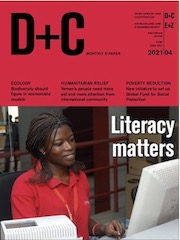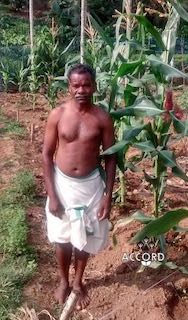The Green Revolution has changed life in Indian villages, but the main beneficiaries were the landlords. Daily labourers remain poor and marginalised. The limits of using ever more fertiliser and pesticides are becoming apparent. Many farmers are confused because extension services want them to re-consider practices they were told to abandon not that long ago. A member of the Santal tribe, an Adivasi community, assesses things from the village perspective. […]
Policymakers’ focus on agriculture has delivered results. The Green Revolution that set in in the mid-sixties has dramatically raised productivity. It was based on mechanisation, irrigation, improved seed, fertilisers and related matters. India’s harvests of rice, wheat and potatoes have risen spectacularly.
In recent decades, the nation has been producing enough food to feed itself even though the population has more than doubled from 550 million in 1971 to more than 1.2 billion in 2011. […]
The most important change, however, is that the farmers no longer work in a basically self-sufficient manner. They used to depend on the landlords, now they depend on the government and various private-sector companies as well. […]
Groundwater resources are being depleted. Biological diversity has suffered tremendously, and there are hardly any forests left in our region.
Climate change compounds these worries. The weather has been becoming increasingly erratic in recent years, and the Monsoon rains seem less predictable than they used to be. […]
But the tribal and marginalised people, who account for at least five percent of West Bengal’s population, are landless, though some do own very little plots. […]
Realising the problems, the state government is now trying to motivate farmers to cultivate crops that need less water. Moreover, extension officers promote rainwater harvesting and the use of vermin and bio compost. They also advise farmers to gear their production to market demand, emphasising high-value goods such as vegetables and fruits. The basic idea is to use natural and human resources more economically.
However, many farmers are not convinced. They feel confused: “We did what the government officials told us,” says one Santal farmer. “We experimented with new seed, fertilisers, pesticides, and we sold off our oxen and now use the tractor. But after seeing these side effects they tell us to return to the former methods.” […]
Our own self-help organisation, the Ghosaldanga Adibasi Seva Sangha, is doing its best to support farmers too. We are running an organic orchard for example. Moreover, we have begun mushroom cultivation and aquaculture fishery. We promote chemical-free vegetables cultivation, bee keeping and farming. […]

Learn more about this and other murals in West Bengal >>

Related posts >>
Source: “As the limits of the Green Revolution are becoming ever more obvious, Indian agriculture faces huge challenges” | D+C – Development + Cooperation, 26/05/2014
Address : https://www.dandc.eu/en/article/limits-green-revolution-are-becoming-ever-more-obvious-indian-agriculture-faces-huge
Date Visited: 2 July 2020
[Bold typeface added above for emphasis]
Dr. Boro Baski works for the community-based organisation Ghosaldanga Adibasi Seva Sangha in West Bengal. The NGO is supported by the German NGO Freundeskreis Ghosaldanga und Bishnubati. He was the first person from his village to go to college as well as the first to earn a PhD (in social work) at Viswa-Bharati. This university was founded by Rabindranath Tagore to foster integrated rural development with respect for cultural diversity. The cooperation he inspired helps local communities to improve agriculture, economical and environmental conditions locally, besides facilitating education and health care based on modern science.
He authored Santali translations of two major works by Rabindranath Tagore, the essay “Vidyasagar-Charit” and the drama Raktakarabi (English “Red Oleanders”), jointly published by the Asiatic Society & Sahitya Akademi (India’s National Academy of Letters) in 2020.
Other posts contributed by Dr. Boro Baski >>
Ghosaldanga Bishnubati Adibasi Trust
Registration under Trust Registration Act 1982
P.O. Sattore, Dist. Birbhum
West Bengal-731 236
India
For inquiries on Santal cultural and educational programs, please contact:
Mob. 094323 57160
D+C Development and Cooperation is a website and a monthly print magazine, funded by Germany’s Federal Ministry for Economic Cooperation and Development and commissioned by ENGAGEMENT GLOBAL. D+C does not serve as a governmental mouthpiece. Our mission is to provide a credible forum of debate, involving governments, civil society, the private sector and academia at an international level. D+C is the identical twin of E+Z Entwicklung und Zusammenarbeit, the leading German language publication on development issues. D+C and the German sibbling E+Z share the same content.
Source: About us | D+C – Development + Cooperation
Address : https://www.dandc.eu/en/about-us
Date Visited: Tue Jul 08 2014 10:22:18 GMT+0200 (CEST)
“Movements of farmers and farm labourers […] are headed for serious trouble if they do not factor in the problems of climate change (which have already devastated agriculture in India); if they do not locate themselves in, and link their battles to, an agroecological approach.” – P. Sainath in “We Didn’t Bleed Him Enough”: When Normal is the Problem (counterpunch.org, 12 August 2020, first published in Frontline magazine) | More about climate change | United Nations on climate change >>

Listen to (Land) Back to the Future by Riley Yesno on the CBC Ideas website >>
“In less than 200 years, photography has gone from an expensive, complex process to an ordinary part of everyday life. From selfies to satellites, most of the technology we use and spaces we inhabit rely on cameras. […] While photographic documentation can aid in shaping history, it can also be a window into the horrors of the past.” – Read more or listen to Butterfly Effect 9 – The Camera on CBC Radio Spark 26 May 2023 >>
Learn from M S Swaminathan – a world renowned scientist – how biological diversity contributes to public health, people’s livelihood and environmental security in addition to food security: his call on fellow citizens to use and share resources in a more sustainable and equitable manner; outlining the long journey from the 1992 Earth Summit to a commitment to foster inherited knowledge through India’s Biodiversity Act and Genome Saviour Award; an award intended to reward those who are “primary conservers” – guardians of biological diversity!
More about the work of his foundation which “aims to accelerate use of modern science and technology for agricultural and rural development to improve lives and livelihoods of communities.” – www.mssrf.org | Regarding the issues of food security raised above, and the nutritional value of indigenous grains, seeds and millets, read an in-depth report that concludes that “the tribal food basket has always been diverse and nutritious” >>
Up-to-date reports by Indian experts and journalists
Search tips
Combine the name of any particular state, language or region with that of any tribal (Adivasi) community.
Add keywords of special interest (music, poetry, dance just as health, sacred grove and biodiversity); learn about the rights of Scheduled Tribes such as the “Forest Rights Act” (FRA); and the United Nations “Declaration on the Rights of Indigenous Peoples”, “Universal Declaration of Human Rights”, “women’s rights”, or “children’s right to education”.
Ask a question that includes “tribal” or “Adivasi”, for instance: “Adivasi way of life better?” (or “tribal way of life worse?”)
Specify any particular issue or news item (biodiversity, bonded labour and human trafficking, climate change, ecology, economic development, ethnobotany, ethnomedicine, global warming, hunter-gatherers in a particular region or state, prevention of rural poverty, water access).
For official figures include “scheduled tribe ST” along with a union state or region: e.g. “Chhattisgarh ST community”, “Himalayan tribe”, “Scheduled tribe Tamil Nadu census”, “ST Kerala census”, “Particularly Vulnerable Tribal Group Jharkhand”, “PVTG Rajasthan”, “Adivasi ST Kerala”, “Adibasi ST West Bengal” etc.
In case the Google Custom Search window is not displayed here try the following: (1) toggle between “Reader” and regular viewing; (2) in your browser’s Security settings select “Enable JavaScript” | More tips >>
Note: hyperlinks and quotes are meant for fact-checking and information purposes only | Disclaimer >>
List of websites covered by this Google custom search engine
Academia.edu (platform for academics to share research papers) – www.academia.edu
Archive.org – https://archive.org
Centre for Science and Environment – https://www.cseindia.org
Current Conservation – https://www.currentconservation.org
Development and Cooperation (D+C) https://www.dandc.eu
Down To Earth (India) – www.downtoearth.org.in
India Environment Portal – www.indiaenvironmentportal.org.in
Harnessing Nature Magazine – https://harnessingnature.online
Kalpavriksh Environmental Action Group – https://kalpavriksh.org
Mongabay-India – https://india.mongabay.com
M S Swaminathan Research Foundation – www.mssrf.org
Navdanya (protecting India’s biodiversity based food heritage) – https://navdanya.org
Third World Network (Penang, Malaysia) – https://twn.my
The Shola Trust (nature conservation in the Nilgiri region) – www.thesholatrust.org
WorldCat (“the world’s largest library catalog, helping you find library materials online”) – https://worldcat.org
Research the above issues with the help of Shodhganga: A reservoir of theses from universities all over India, made available under Open Access >>
Note: hyperlinks and quotes are meant for fact-checking and information purposes only | Disclaimer >>
Learn more
Atree.org | Ashoka Trust for Research in Ecology & the Environment (posts)
Biodiversity | Biodiversity hotspot | Hyderabad biodiversity pledge
Climate change | Audio | The Climate Question (BBC Podcast)
eBook | Background guide for education
Ecology and environment | Eco tourism | Tourism | Wildlife tourism
Environmental history and what makes for a civilization – Romila Thapar
Equations blog (Equitable Tourism Options)
Forest Rights Act (FRA) | Hunter-gatherers | Illegal mining | Legal rights over forest land
Information provided by Indian government agencies and other organizations (FAQ)
Nature and wildlife | Crocodile | Elephant | Tiger | Mangrove forest | Trees
PARI’s tales from tiger territory | People’s Archive of Rural India (PARI)
Shola Trust | Nilgiri Biosphere
Water and development – India’s tribal communities
Western Ghats – tribal heritage & ecology
What is the Forest Rights Act about?
Who is a forest dweller under this law, and who gets rights?
